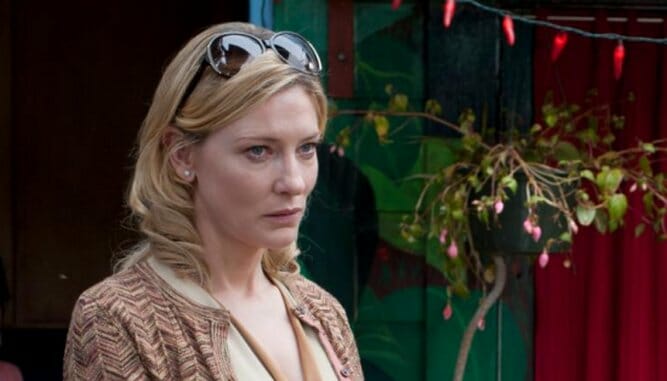Blue Jasmine

Blue Jasmine is no Purple Rose of Cairo or like any of Woody Allen’s earlier, funnier stuff. It is somber and bitter, almost too much to enjoy. But since Allen is in the director’s chair, comedy relief can be found in the simplest long shot of a cramped apartment with too many personalities. Blue Jasmine is Woody Allen’s answer to the economic crash in the U.S.: the feelings of betrayal it left us with, the overhanging guilt of our compliance, yet still recalling the memory of a sweet life lived not long ago.
Jasmine (Cate Blanchett) is stressed and hardly recovered from a recent nervous breakdown. After losing the ritz and glitz of the Bernie Madoff-esque fortune of her husband, Hal (Alec Baldwin), she’s unceremoniously dumped on the doorstep of her sister, Ginger (Sally Hawkins). Now stuck with plebeians, Jasmine makes it her mission to get out and on her feet as soon as possible. Lacking a college degree and any serious experience, she’s got her work cut out for her.
In a sense, it’s a meeting of the prince and the pauper, except with both broke in an inexplicably charming San Francisco apartment. There’s a claustrophobic feeling of an inability to escape in many of the situations Jasmine and Ginger find themselves in. For instance, Ginger struggles to find a nice guy, and Jasmine tries to get her to see that she deserves better. But like Jasmine, Ginger seems to have the same deck of cards stacked against her. Despite starring comedians like Louis C.K., Andrew Dice Clay, and Baldwin (who also starred in Allen’s last film, To Rome With Love), there isn’t a flat-out joke in sight. Instead, the comedy is subdued and situational, as when a flustered Jasmine is caught in an elaborate lie or Ginger is stuffily stacking apples while her macho boyfriend pleads with her to come to him.
-

-

-

-

-

-

-

-

-

-

-

-

-

-

-

-

-

-

-

-

-

-

-

-

-

-

-

-

-

-

-

-

-

-

-

-

-

-

-

-








































